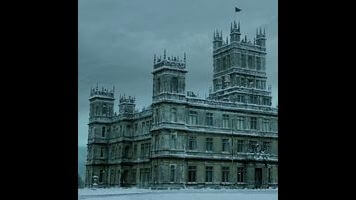Stiff upper lip, now: Downton Abbey says a proper goodbye

Downton Abbey’s final Christmas special opens on an idyll. The Crawleys gather on the lush grounds of the manor, children frolicking, Donk egging them on, the family strolling in step. Tom summarizes the conversation like a headline from Edith’s magazine: “A life change for Lady Edith Crawley is announced as the family take a morning stroll.”
It looks peaceful until you consider half the characters on this show work for the other half. Wandering along the water, then having wine and strawberry sponge in the sun is an idyll; carrying tables and chairs (enough for two separate seating areas and a servants’ counter), crystal, china, and tea service, to say nothing of presenting the food in perfect form, is not. Add formal cocktails on the lawn and picnics in the park, and these lazy summer outings make a lot of drudgery for the manor’s ever-shrinking staff.
But Downton Abbey isn’t above sweeping hard work under the rug. Mary marries Henry without mentioning her dread of his racing; an episode later, Henry gives it up forever. Barrow slashes his wrists; an episode later, he’s upbeat and outgoing (for Barrow), thanking his rescuers and ready to move on. Daisy’s scorn drives off Andy, then a soft word wins him back. Edith resolves to live as a spinster, but a message from Mary brings Bertie back begging for her hand again. That one gesture quiets the sisters’ lifelong feud. Mrs. Pelham denounces Edith as “damaged goods,” but relents completely after a few hours’ offscreen thought. Master George pleads, “Please don’t go,” and by New Year’s Eve, Barrow’s restored to Downton Abbey—and promoted to butler.
Downton Abbey has been one long idyll, a years-long dawdle over claret and cakes on a great estate, reveling in the stately architecture, finery, and mannered gentility of days long gone. Characters gawp over the breakneck pace of change—telephones! gramophones! gentlemen in trade!—but, like Edith’s long-overdue decision to move to London, substantive changes on the show have been as hasty as a glacier.
Also like Edith’s decision, and as always on Downton Abbey, much of the planned change is undone at the episode’s end. Dickie Grey’s death sentence lasts just long enough for Isobel to champion him. Carson’s portents of doom over his tremors—and I mean doom; with Barrow and Molesley leaving, he remarks that “only Andrew stands between me and Armageddon”—end when Lord Crawley assigns him lifelong tenancy and butler-emeritus status. Barrow is rescued from his pathetic new job and his despair, restored to the manor in a position of high esteem. If it’s doubtful that Robert Crawley would install as butler a man he often wished to dismiss, or that Carson would approve a criminal as his successor (in addition to Barrow’s history as a thief, blackmailer, and black-marketer, the exposure of either his homosexuality or his suicide attempt could bring charges upon Barrow and scandal upon the family he serves), or that Barrow, who’s chafed under Carson’s command, would accept the role of butler without the authority it bestows, Downton Abbey doesn’t fret over those details.
As Bates—the often sulky, sometimes sinister Bates who is Downton Abbey’s golden boy—says to Barrow, “I’d rather we part as friends than as enemies.” I don’t have it in me to resent the show’s oversimplification, in part because when it does delve into complications, they’re so well-acted. I had no doubt Edith and Bertie would reconcile before the series’ end, but the combination of shock, empathy, and righteous anger she shows at his ambush at The Ritz does credit to Edith, to Laura Carmichael’s characterization, and to the show.
Masterful performance and direction elevate even excellent writing, and can make even lazy writing compelling. Dickie Grey’s “I didn’t like to bore you” and “I didn’t like to bother you” downplay his own concerns so easily, Isobel almost misses the seriousness of his news. Douglas Reith’s performance and costume—his narrow face just a bit more drawn and shadowed, his gentle eyes a bit sadder, his jaunty suit buckling around his shoulders as if he’s shrinking away—conspire with his words in a perfect portrait of an English gentleman putting on a stiff upper lip. “I’m not too downcast. I’ve had a good innings,” he assures Isobel before gushing, as much as anyone can gush with a stiff upper lip, “I should like to have been married to you. But no man can have everything, and at least we’re friends again.”
Because Penelope Wilton makes Isobel Crawley such a sympathetic, natural character (and because her recent story lines have been largely supporting), I’ve rarely remarked upon her performance. This scene highlights that naturalism. She absorbs the news silently, her reaction playing quietly over her face. A pursed lip, a tightening of her chin, a rueful shine in her eye—in the hands of this actor, that’s all it takes to show the depths of grief, pain, love, regret, and determination.
But this plot is also an example of Downton Abbey preferring melodrama to the demanding task of writing the effects of historical changes into characters’ lives. Isobel, a former nurse and hospital administrator who devours medical news, would know the 1920s brought new hope for the once-fatal diagnosis of pernicious anemia. Instead of a measured conflict in which she campaigns for experimental treatment, Julian Fellowes makes Dickie’s son and daughter-in-law mustache-twirling villains intent on keeping Lord Merton captive while he withers away.
 Keep scrolling for more great stories.
Keep scrolling for more great stories.
